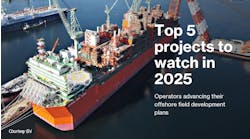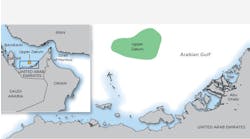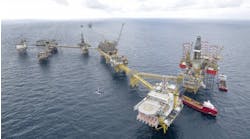Brian Nixon
Decom North Sea
Decommissioning is different than any other aspect of the oil and gas industry activity, since there is no return on expenditures. Encouragingly, this is resulting in a genuine willingness to share ideas and information, consider innovative approaches, and to cooperate and collaborate in a way previously unseen in the industry.
Since its formation in early 2010, Decom North Sea's role in the offshore decommissioning sector has been focused on stimulating the development of a vibrant, efficient and cost- effective supply chain, and to secure maximum economic benefit from decommissioning expenditures.
Latest market findings commissioned by the organization reveal that decommissioning expenditure in the UKCS is forecast to reach £35 billion ($55 billion) over the next 20 to 30 years. This is an increase on initial projections, which put the cost of decommissioning North Sea oil and gas facilities at between £24-30 billion ($38-$47.8 billion) within the same period to 2040.
The offshore oil and gas decommissioning sector is arguably one of the best understood and well-recorded markets. The massive infrastructure that has been developed over the past 40 years is well documented, and the scale of the overall challenge is clear. What is not so well appreciated is exactly when the market will unfold, and how each operator will approach and manage its respective programs. Many operating companies are planning and preparing for their first decommissioning project, and the industry could well experience a number of different approaches in the years to come.
In the North Sea, the industry is witnessing the beginnings of a move from "informal" collaboration (i.e. the sharing of experience and ideas) toward more "formal" collaboration, where companies actually commit to some form of joint industry project in the knowledge that they will all stand to gain from the output of the project. One such initiative currently being scoped by industry and led by Decom North Sea is the development of a standard decommissioning program.
An initial workshop was held on Jan.12, 2012, to gather the views and support of members and relevant stakeholders. The goal was to move forward the initiative and develop a standard template for decommissioning plans. The initiative will be facilitated and managed by the organization under the guidance of a small industry steering group.
Many of the North Sea's near-future oil and gas decommissioning projects will be the first to be undertaken by their respective operators. The very detailed decommissioning plans that have to be prepared in advance by each operator require very considerable research into design considerations, options appraisal, environmental impact assessments, risk identification and mitigation, technical and safety management, and many other aspects.
Currently, each operator is interpreting the requirements for these decommissioning plans in its own way, with previous documents having ranged from 100 to more than 400 pages in length. This clearly is inefficient for operators and regulators alike. In order to improve the situation, Decom North Sea facilitated the January workshop with its member companies to establish how best to develop a standard template for these important documents.
The initiative is attracting strong backing from the organization's operator members, and also from the Department for Energy and Climate Change, which is responsible for processing and approving the increasing number of decommissioning plans over coming months and years. Operators and supply chain companies not currently members, but who are interested in this initiative, are invited to make contact throughwww.decomnorthsea.com.
The decommissioning sector is at an early stage of its development, with only 7% of the infrastructure in the UK sector of the North Sea having been decommissioned to date. These early projects were executed singly, and the industry has therefore not been able to benefit from any continuity or repetition. Knowledge transfer and the sharing of experience have so far been extremely limited.
There is therefore a lot to do before the industry becomes truly efficient, cost-effective and innovative, and before investment becomes routine. Decom North Sea is charged with leading this industry development, which we endeavor to achieve in part through the standard decommissioning program.
The organization is taking a holistic, rounded view on the market, and the respective strengths and capabilities of the countries that surround the basin. The initial analysis conducted by the industry steering group which led to the formation of Decom North Sea, concluded that the North Sea decommissioning market will be too large and too complex for any single European country to manage.
Market forecasts show that multiple projects can be expected each year over the coming decades, and almost from a standing start. When this is considered in conjunction with projected activity levels in other sectors (new developments and life extension projects in oil and gas, offshore wind developments, marine energies, etc.), it seems clear that the North Sea will experience capacity constraints in many areas. These included vessels, engineering and management personnel, skilled decommissioning technicians, ports and harbors, onshore disposal yards, and specialist equipment.
Over the past year, Decom North Sea has driven its strategic objectives which were developed following a consultation with its member companies and, importantly, with its board of industry directors. One of the most important objectives is to improve the level of market intelligence that is available to DNS members.
With three independent sources of market intelligence commissioned by Decom North Sea, there can be some confidence in the overall size and shape of the forecasts. We know that industry can expect expenditures to rise sharply from a current level of about £500million to over £1 billion ($1.59 billion) per annum within the next two to three years, perhaps reaching as many as 10 decommissioning projects each year.
However, greater detail is needed within these macro forecasts to allow individual businesses to identify which operator is moving forward in which phase of activity with a certain asset at any given time. For this reason, the organization has brought together a work group of analysts from its member companies to help provide further analysis of the available data.
Acknowledging that decommissioning in the oil and gas sector is still at an early stage, the organization is also working with partner trade organizations in the nuclear and salvage sectors. A series of workshops is under way to identify what knowledge and experience can be shared, and identify if technologies, techniques or working practices can be transferred. It is similarly recognized that some oil and gas technologies could well find application in these other sectors.
Contracting and remuneration strategies are other areas requiring further development. Although some specific aspects of offshore decommissioning can be sufficiently well defined and scoped to permit a lump sum approach, many others require a style of contract and remuneration which is able to deal with the unknown and unforeseen, the unavoidable delays and interruptions to schedule. With consultancy member Accenture, Decom North Sea is developing a framework covering the nine phases of offshore decommissioning. From this, it will then be able to assess various kinds of risk; identify who is best placed to manage or mitigate these risks; and then to suggest an appropriate remuneration style for each phase and type of facility.
In addition to these (and more) specific initiatives designed to improve the effectiveness and efficiency of the industry, the organization provides a wide range of membership benefits, including content provided on the organization's website; a series of networking events where operators share their forthcoming plans with members; promotional opportunities in the DNS newsletters, conferences, workshops, trade and research visits to North Sea countries; assistance with introductions; and similar efforts.
Since its inception, the organization has attracted over 180 members, illustrating a growing awareness of the impending ramp up in decommissioning activity. These companies are drawn from across the full spectrum of the industry, large and small, shore-based and offshore, topsides and subsea, service providers and consultants, operators and contractors.
The industry has a wonderful opportunity to plan and prepare prior to a major upsurge in complex offshore activity, and must do everything possible to ensure value for all parts of the industry and supply chain.
The author
Brian Nixon is chief executive, Decom North Sea, a position he accepted at the beginning of 2010. He has many years of public sector experience starting with a UK industry secondment as 1st Secretary, Oil & Gas, to the British Embassy in Angola in 2001, followed by a long period as Director of Energy with Scottish Enterprise. Nixon is a European Engineer, Chartered Engineer, Fellow of the Institution of Mechanical Engineers, and Fellow of the Energy Institute.
Offshore Articles Archives
View Oil and Gas Articles on PennEnergy.com






